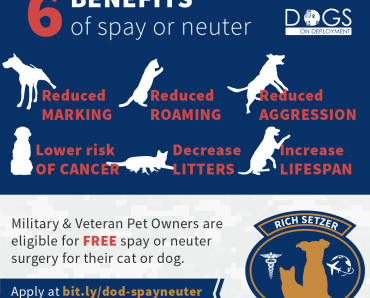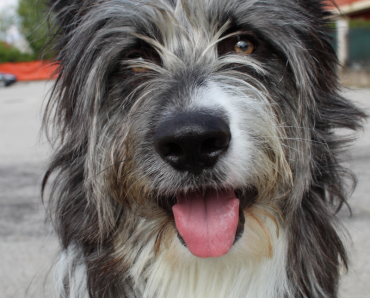While the majority of our foster families, volunteers, and service members have overwhelmingly positive experiences with our programs, it’s important to highlight instances when something doesn’t go perfectly. When a foster experience goes to the dogs as it were, it doesn’t have to be all bad news though; we can learn from it to help future fosters and service members avoid the same scenarios.
Kate (all names have been changed), a wonderful volunteer boarder, has just such a cautionary tale to share. Like all of our volunteers, Kate couldn’t wait to be matched up to the perfect dog, and help a service member.
She says, “Our service members have made an incredible commitment by making the decision to serve our country, and to go where they are called…we who benefit from their service can honor their commitment by providing their furry companion(s) a safe, nurturing environment that allows their pet’s spirit to thrive, until the return of their master.”
Kate has experience with dogs; she has 35lb, unneutered, male Queensland Heeler. Her house is so dog friendly that the standing rule is that “when friends visit, they bring their dog(s)!” she says.
So, when she saw Jack’s dog, Britta, a 70lb Akita, listed on our website, she thought it would be a good match, and they arranged a meeting. Kate was undeterred by Britta’s size. She thought that she could handle a larger dog, and Britta’s sweet demeanor, with people, put her at ease.
Still, in Kate’s eagerness to find a way to help, and in Jack’s eagerness to find a good home for Britta before his impending deployment, they were both too quick to overlook potential problems. Unfortunately, these potential problems turned into large problems down the road.
While Jack was still home, they went on a getting acquainted hike with one of Kate’s friends, and another small dog. During an off-leash moment, Britta lunged at, and bit the small dog, causing enough damage that the small dog needed an extensive veterinary visit, and additional visits for infection.
The incident, while upsetting, went smoothly, and was resolved amicably between all parties. Because Kate and Jack were both present, they agreed that they both bore responsibility for the incident, as they both should’ve been more careful about the off-leash moment. They decided to split the cost of the bill.
However, it’s DoD policy to not board dogs with a bite history, and in hindsight, this should’ve been a red flag for Kate, about Britta not being an ideal fit for her household. But, time was short for Jack now, and she was still eager, and confident in her ability to help – a combination that just wouldn’t work for anyone, including Britta.
When Jack dropped Britta off, things deteriorated quickly. Jack informed Kate that Britta had recently attacked and killed a goat, and she heard of an additional violent encounter in which Britta attached another dog.
Because Jack’s departure was imminent, and because Britta was so gentle, kind and obedient with her, Kate felt obligated to take Britta anyway: the pressure of Jack’s departure date, and her original commitment weighed on her; and, her knowledge of simple obedience and training seemed like it would be enough to handle the situation.
It didn’t take long for Britta to clash with her dog. Britta attacked her dog, biting him in the neck, and injuring him. She says that she thinks the attack was a “warning,” a way to assert dominance and indicate Alpha status, in a situation where her dog was certainly used to dominating that position. She believes that while the injury was not life-threatening, Britta certainly could’ve killed her dog, had she intended to.
She tells us, upon reflection, both the Akita and the Queensland are dominant dogs, by nature, and were likely not ideal dogs to be boarded together. Because they are both naturally affectionate to their human masters, it’s easy to see good, kind, and even gentle behavior in dogs that are separate from other dogs; but then see aggressive behavior when they are placed with other animals.
Unfortunately, because of this, to keep both dogs safe, an immediate change in boarding situation had to be made. Kate contacted us, and Jack, and the process began. Britta had to be muzzled when she was with Kate’s dog, which pained Kate. She says, “no dog can thrive by being muzzled.” Plus, she couldn’t take either dog out on play dates, hikes or walks – taking one without the other caused jealousy and resentment, and taking both was out of the question. She calls the situation “untenable.”
Thankfully, within a week, another placement was found for Britta. Although it was a relief to get things back to normal in the house, she says that saying goodbye to her was “bittersweet.” She says that, overall, Britta was “absolutely beautiful and very loving.”
As a warning to others, she says that it was her “naivety and eagerness” that created this situation, combined with “pressure” from Jack. In all, we couldn’t have asked for a more cooperative, reasonable, and patient foster, in this stressful situation. Her first concern was always the dogs, and in reaching a peaceful resolution.
Meet and Greet
Never underestimate the value of meeting the animal and the owner. If you are uncomfortable with either, it’s okay to say no. Remember, this animal will be in your home for an extended period of time, and you will be responsible to this service member; if there’s hesitancy, allow yourselves to find a match that works better for both of you. Don’t settle for just one meet and greet. Consider having your first meet and greet in a dog park, or public place where neither dog has a territorial claim, and others to occur at the home where the dog will be boarded. It may also be a good idea to schedule an overnight trial run, if time permits.
Familiarize Yourself With the Breed
If you are entering into a foster relationship with a breed that you are unfamiliar with, research the breed. If you find that the breed has natural tendencies that don’t integrate well with your household, lifestyle, or personal training philosophies, someone else may be a better match.
Animal’s History
Ask lots of questions about the animal’s health history, especially if you are integrating a pet into a home with other animals. It’s not being nosy; it’s being smart. You would want to know if an animal were bringing disease into your home, just like you’d want to know if the animal had a history of aggression. Some things to consider include, but aren’t limited to, socialization and health history.
Contract
Dogs on Deployment encourages that you use a contract to seal the arrangement between the foster and service member. This protects both of you, in the case of any financial issues, and clearly spells out anything that might go wrong. Make sure you both agree to the terms on the contract and make any additions or deletions as you deem fit.
Consider Insurance
Deployment is a stressful time, and it doesn’t need to be made more so by the sudden financial burden of a sick animal. Consider Pet Insurance to cover any medical expenses that may crop up. Dogs on Deployment partners with Pets Best Insurance.
DoD doesn’t allow animals with a bite history to be listed on the website; however, bite insurance may not be a bad idea, if there is any fear of this being an issue.
Contact DoD
Should anything go wrong before, or during boarding, don’t hesitate to contact Dogs on Deployment. While DoD is not responsible for any occurrences during boarding, we do offer our support, advice and help if able. Boarding should be a positive experience for DoD Boarder, pet owner and pet, are our goal is to ensure this.







